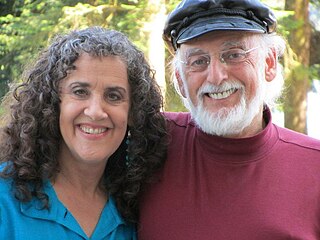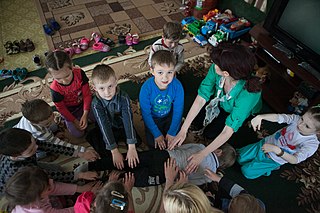Related Research Articles

Cognitive behavioral therapy (CBT) is a psycho-social intervention that aims to reduce symptoms of various mental health conditions, primarily depression and anxiety disorders. Cognitive behavioral therapy is one of the most effective means of treatment for substance abuse and co-occurring mental health disorders. CBT focuses on challenging and changing cognitive distortions and their associated behaviors to improve emotional regulation and develop personal coping strategies that target solving current problems. Though it was originally designed to treat depression, its uses have been expanded to include the treatment of many mental health conditions, including anxiety, substance use disorders, marital problems, ADHD, and eating disorders. CBT includes a number of cognitive or behavioral psychotherapies that treat defined psychopathologies using evidence-based techniques and strategies.

Psychotherapy is the use of psychological methods, particularly when based on regular personal interaction, to help a person change behaviour, increase happiness, and overcome problems. Psychotherapy aims to improve an individual's well-being and mental health, to resolve or mitigate troublesome behaviours, beliefs, compulsions, thoughts, or emotions, and to improve relationships and social skills. Numerous types of psychotherapy have been designed either for individual adults, families, or children and adolescents. Certain types of psychotherapy are considered evidence-based for treating some diagnosed mental disorders; other types have been criticized as pseudoscience.

Albert Ellis was an American psychologist and psychotherapist who founded rational emotive behavior therapy (REBT). He held MA and PhD degrees in clinical psychology from Columbia University, and was certified by the American Board of Professional Psychology (ABPP). He also founded, and was the President of, the New York City-based Albert Ellis Institute. He is generally considered to be one of the originators of the cognitive revolutionary paradigm shift in psychotherapy and an early proponent and developer of cognitive-behavioral therapies.
Erikson's stages of psychosocial development, as articulated in the second half of the 20th century by Erik Erikson in collaboration with Joan Erikson, is a comprehensive psychoanalytic theory that identifies a series of eight stages that a healthy developing individual should pass through from infancy to late adulthood.
The Hakomi Method is a form of mindfulness-centered somatic psychotherapy developed by Ron Kurtz in the 1970s.
Solution-focused (brief) therapy (SFBT) is a goal-directed collaborative approach to psychotherapeutic change that is conducted through direct observation of clients' responses to a series of precisely constructed questions. Based upon social constructivist thinking and Wittgensteinian philosophy, SFBT focuses on addressing what clients want to achieve without exploring the history and provenance of problem(s). SF therapy sessions typically focus on the present and future, focusing on the past only to the degree necessary for communicating empathy and accurate understanding of the client's concerns.
Elissa Panush Benedek is an American psychiatrist specializing in child and adolescent psychiatry and forensic psychiatry. She is an adjunct clinical professor of psychiatry at the University of Michigan Medical Center. She served as director of research and training at the Center for Forensic Psychiatry in Ann Arbor for 25 years and was president of the American Psychiatric Association from 1990 to 1991. She is regarded as an expert on child abuse and trauma, and has testified in high-profile court cases. She also focuses on ethics, psychiatric aspects of disasters and terrorism, and domestic violence. In addition to her own books, book chapters, and articles, she has collaborated with her husband, attorney Richard S. Benedek, on studies of divorce, child custody, and child abuse.

John Mordechai Gottman is an American psychologist, professor emeritus of psychology at the University of Washington. His work focuses on divorce prediction and marital stability through relationship analyses. The lessons derived from this work represent a partial basis for the relationship counseling movement that aims to improve relationship functioning and the avoidance of those behaviors shown by Gottman and other researchers to harm human relationships. His work has also had a major impact on the development of important concepts on social sequence analysis. He and his wife, psychologist Julie Schwartz Gottman, co-founded and lead a relationship company and therapist training entity called The Gottman Institute. They have also co-founded Affective Software Inc, a program designed to make marriage and relationship counseling methods and resources available to a larger audience.

Play therapy refers to a range of methods of capitalising on children's natural urge to explore and harnessing it to meet and respond to the developmental and later also their mental health needs. It is also used for forensic or psychological assessment purposes where the individual is too young or too traumatised to give a verbal account of adverse, abusive or potentially criminal circumstances in their life.
Body psychotherapy, also called body-oriented psychotherapy, is an approach to psychotherapy which applies basic principles of somatic psychology. It originated in the work of Pierre Janet, Sigmund Freud and particularly Wilhelm Reich who developed it as vegetotherapy. Branches also were developed by Alexander Lowen, and John Pierrakos, both patients and students of Reich, like Reichian body-oriented psychotherapy and Gerda Boyesen.

Complex post-traumatic stress disorder (CPTSD) is a stress-related mental disorder generally occurring in response to complex traumas, i.e. commonly prolonged or repetitive exposures to a series of traumatic events, within which individuals perceive little or no chance to escape.
Bibliotherapy is a creative arts therapy that involves storytelling or the reading of specific texts. It uses an individual's relationship to the content of books and poetry and other written words as therapy. Bibliotherapy partially overlaps with, and is often combined with, writing therapy.
Diana Adile Kirschner is an American psychologist and author. Early in her career she was involved in the field of integrative psychotherapy, a movement that seeks to find the best practices from among the major schools of therapy. Kirschner's work involved integrating individual therapy, couples therapy, and family therapy into an approach called Comprehensive Family Therapy. The book she coauthored, Comprehensive Family Therapy, was nominated by the American Psychological Association as one of the 100 most important books on family psychology.
Frank Smith Pittman, III, M.D. was an American psychiatrist and author. He wrote a regular column, "Ask Dr. Frank", which used to appear in Psychology Today.

Private Lies: Infidelity and Betrayal of Intimacy is a non-fiction book by psychiatrist and family therapist Frank Pittman, M.D. Private Lies was first published in hardcover edition in 1989 by W. Then, W. Norton & Company by the same publisher in a paperback edition in 1990.
Interpersonal psychotherapy (IPT) is a brief, attachment-focused psychotherapy that centers on resolving interpersonal problems and symptomatic recovery. It is an empirically supported treatment (EST) that follows a highly structured and time-limited approach and is intended to be completed within 12–16 weeks. IPT is based on the principle that relationships and life events impact mood and that the reverse is also true. It was developed by Gerald Klerman and Myrna Weissman for major depression in the 1970s and has since been adapted for other mental disorders. IPT is an empirically validated intervention for depressive disorders, and is more effective when used in combination with psychiatric medications. Along with cognitive behavioral therapy (CBT), IPT is recommended in treatment guidelines as a psychosocial treatment of choice for depression.

Daniel J. Siegel is a clinical professor of psychiatry at the UCLA School of Medicine and executive director of the Mindsight Institute.
Child psychoanalysis is a sub-field of psychoanalysis which was founded by Anna Freud.

Jean Mercer is an American developmental psychologist and professor emerita of psychology at Stockton University. Founder of the advocacy group Advocates for Children in Therapy, she is known as an advocate for adopted children and those who come from the foster care system, and as an outspoken critic of attachment therapy.

Julie Schwartz Gottman is an American clinical psychologist, researcher, speaker, and author. Together with her husband and collaborator, John Gottman, she is the co-founder of The Gottman Institute – an organization dedicated to strengthening relationships through research-based products and programs. She is the co-creator of the Sound Relationship House Theory, Gottman Method Couples Therapy, and The Art and Science of Love weekend workshop for couples, among other programs. In addition to her internationally recognized clinical work, Julie Schwartz Gottman is the author or co-author of six books – Ten Lessons to Transform Your Marriage, And Baby Makes Three, 10 Principles for Doing Effective Couples Therapy, The Man's Guide to Women, The Marriage Clinic Casebook, and The Science of Couples and Family Therapy. She is also the co-author of over 30 peer-reviewed journal articles.
References
- ↑ "Author Chat with Richard Bromfield". Teachers.Net. November 1, 2000. Archived from the original on October 6, 2008. Retrieved 2009-02-28.